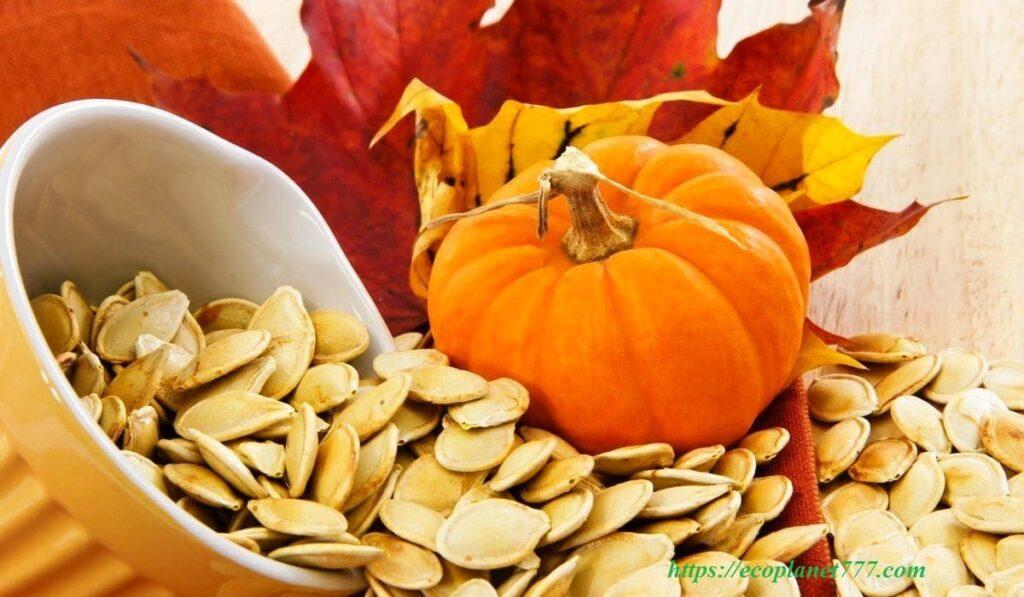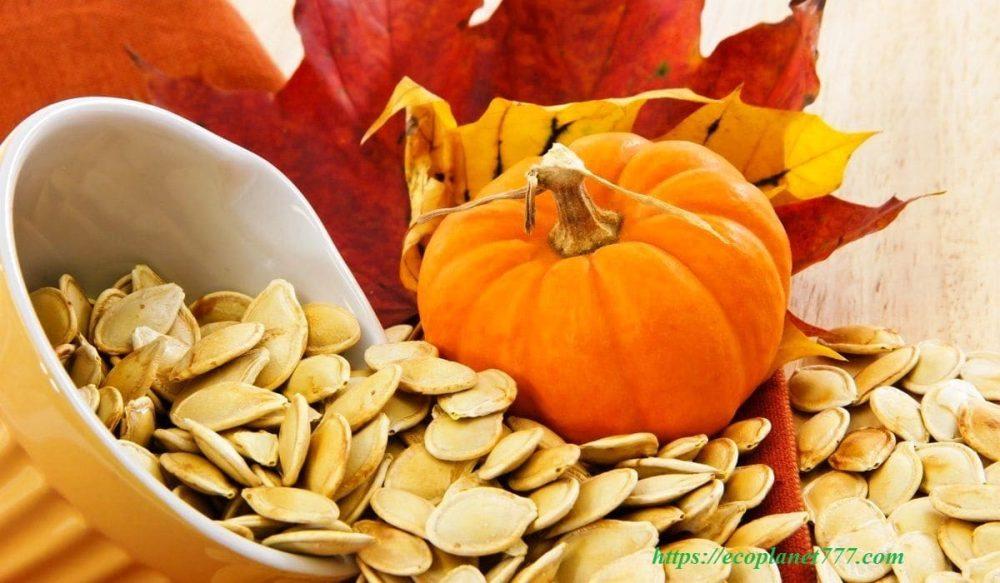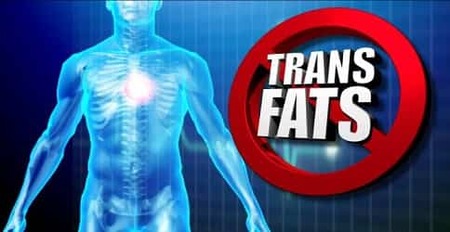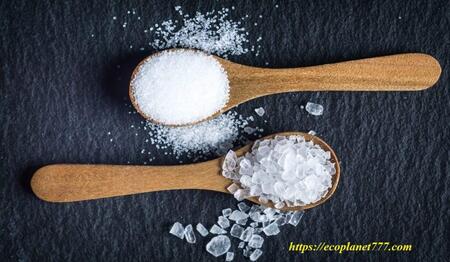Pumpkin seeds are an incredibly healthy type of seed that have been grown all over the world for thousands of years. Pumpkin seeds are very healthy and are a good source of protein and fiber, as well as important vitamins and minerals such as manganese, magnesium, phosphorus, copper, iron, and zinc.
It’s hard to imagine autumn without a bright orange fruit called pumpkin. Unfortunately, pumpkin seeds are often ignored or discarded altogether in favor of the brightly colored pumpkin pulp.
However, these seeds, and pumpkin oil in particular, have many health benefits that make them a worthy addition to your diet and essential for overall health.
They have long been valued for their unique taste and powerful healing properties. Archaeologists have found these seeds in parts of Mexico that date back to around 7000 BC. Indigenous peoples of North America also often used pumpkin seeds for their intestinal health benefits as a treatment for parasitic infections, including those from tapeworms.
Health benefits of pumpkin seeds
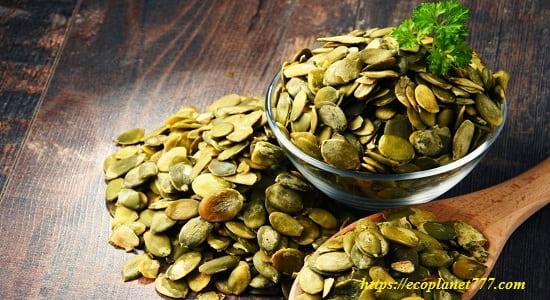
Useful properties
Help in the fight against parasites
It has long been known that pumpkin seeds are eaten to eliminate tapeworms and other parasites from the body. Children who are especially prone to worms are advised to give pumpkin seeds as a snack. They will be beneficial for the health of the gastrointestinal tract, not only in children, but also in adults.
Hair Benefits
Pumpkin seeds contain a compound called cucurbitacin, an amino acid that promotes hair growth. Other nutrients contained in the seeds make hair healthy and strong.
Bone Health
Pumpkin seeds are a good source of magnesium and calcium, which are important for bone formation. A high intake of these minerals increases bone density and reduces the risk of osteoporosis in postmenopausal women.
Medicinal properties
Diabetes
One of the main benefits of pumpkin seeds is their ability to regulate blood sugar levels, which is important for preventing diabetes symptoms such as increased thirst, fatigue, frequent urination, and nausea.
Pumpkin seeds contain proteins and fiber that slow down the absorption of sugar in the bloodstream, which contributes to better control of blood glucose levels.
The nutrients in pumpkin seeds help protect against type 2 diabetes. In one experiment, diabetic rats began to recover and recover after eating a diet containing a mixture of flax seeds and pumpkin.
Pumpkin seeds are a good source of magnesium. Studies have shown that consuming 100 mg of magnesium per day reduces the risk of developing type 2 diabetes by about 15 percent (100 grams of pumpkin seeds contain more than 90 mg of magnesium).
Heart health
The antioxidants, zinc and magnesium in this superfood support heart health. In addition, pumpkin seeds help control high blood pressure and high cholesterol.
They also increase the level of nitric oxide in the body. This helps expand the blood vessels and improve blood flow so the heart can work more efficiently.
The fiber in pumpkin seeds reduces the total amount of cholesterol in the blood and the risk of heart disease.
Researchers reviewing clinical trials in 2013 concluded that the combination of nutrients found in pumpkin seeds helps protect the cardiovascular system and prevent coronary heart disease.
Heart and liver health
The seeds contain healthy oils that benefit the heart, liver, and cardiovascular system.
They contain omega-3 and omega-6 fatty acids, antioxidants and fiber. This combination is beneficial for both the heart and the liver.
Omega-3 helps:
- reduce the risk of thrombosis and arrhythmias that lead to heart attack, stroke and sudden cardiac death
- reduce LDL, total cholesterol and triglycerides
- reduce atherosclerosis, fatty deposits on the walls of arteries
- improve endothelial function, an indicator of circulatory health
slightly lower blood pressure.
Pumpkin seeds have been found to contain sterols. For example, 100 g of pumpkin seeds contain 265 mg of sterols. Plant sterols and phytosterols are known to help lower “bad” LDL cholesterol levels.
A rodent study found that the nutrients in a mixture of flaxseed and pumpkin have beneficial effects on the liver and also protect against atherosclerosis.
Weight loss and digestion
A high-fiber diet also helps maintain a healthy weight because a person feels full longer after eating.
Improves the health of the digestive system.
The immune system
Pumpkin seeds contain a lot of vitamin E and other antioxidants. It strengthens the immune system and keeps blood vessels healthy.
Prevention of insomnia
Pumpkin seeds are a rich source of tryptophan, an amino acid.
Tryptophan is used to treat chronic insomnia because the body converts it into serotonin, the “feel good” or “relaxing” hormone, and melatonin, the “sleep hormone.”A study published in 2005 in the journal Nutritional Neuroscience found that consumption of tryptophan from pumpkin seeds, along with a carbohydrate source, was comparable to pharmaceutical-grade tryptophan for the treatment of insomnia.
A few pumpkin seeds before bed, which contain a small amount of carbohydrates, provide your body with tryptophan, which is necessary for the production of melatonin.
Pumpkin seeds are also a good source of magnesium, an essential micronutrient that has been shown to help improve several measures of insomnia, including sleep efficiency, sleep duration, and the amount of time it takes to fall asleep at night.
Pregnancy
Pumpkin seeds are a good source of zinc. The researchers found that 100 g of pumpkin seeds contain 7.99 mg of zinc. Recommended daily intake: 11 mg of zinc for men (ages 19 and older) and 8 mg for women.
The World Health Organization (WHO) estimates that more than 80 percent of women worldwide have insufficient zinc intake. A low level of this element negatively affects the production of many hormones, including those that affect fertility.
During pregnancy, an additional amount of zinc is recommended, as this affects the health of not only the mother, but also the child.
Zinc is also an important source for normal immune function and prevention of uterine infections.
Antioxidant activity
Pumpkin seeds are rich in antioxidants, which are powerful compounds that fight free radical formation and protect cells from oxidative stress. Some studies also show that antioxidants help prevent chronic conditions such as heart disease, cancer, diabetes, and autoimmune disorders.
A German study published in 2012 found that high consumption of pumpkin seeds reduced the risk of breast cancer after menopause.
Another animal study from South Africa found that a certain type of protein extracted from pumpkin seeds is effective in protecting against liver damage due to its powerful antioxidant properties.
Antioxidants are considered “scavengers” tasked with removing unwanted waste products known as free radicals. If these substances remain in the body, the risk of a number of health problems increases.
Antioxidants reduce various types of inflammation. One study published in 1995 found that rats with arthritis improved their symptoms after taking pumpkin seed oil.
Help fight cancer cell growth
Due to their high antioxidant content, pumpkin seeds help fight the growth and spread of cancer cells, which is essential for cancer prevention.
One study found that phytoestrogen extracts found in pumpkin seeds have anti-cancer properties and are therefore beneficial in the prevention and treatment of breast cancer.
In addition, according to a review published in Food Research International, diets rich in pumpkin seeds are associated with a lower risk of several types of cancer, including stomach, lung, colon, and breast cancers.
Skin and eye health
Pumpkin seeds are a good source of squalene, an antioxidant compound. It is present in all tissues of the body and plays a role in protecting the skin from UV radiation and other types of radiation exposure.
Animal studies have also shown that squalene plays an important role in retinal health and may also provide protection against eye disease.
Sexual health, prostate health
Pumpkin seeds have traditionally been used as an aphrodisiac. In their own study conducted at Mansour University in Egypt, in which rats consumed pumpkin seed extract combined with zinc. The researchers concluded that pumpkin seeds have a beneficial effect on sexual health status.
A study published in 2009 found pumpkin seed oil to be beneficial and effective in treating benign prostatic hyperplasia. Those who consumed 320 mg of the oil per day for 6 months noticed a reduction in symptoms and an improvement in quality of life.
Improved bladder function
Pumpkin seeds have been shown to reduce the symptoms of benign prostatic hyperplasia, a condition that can cause difficulty urinating in men.In 2014, scientists found evidence that pumpkin seed oil can help treat urinary disorders in men and women by reducing symptoms of bladder disease.
Improving Male Fertility
Several human and animal studies have shown that pumpkin seeds are particularly beneficial for male fertility due to their rich content of antioxidants, fatty acids and zinc. In addition, pumpkin seed oil has beneficial effects on prostate health, reducing symptoms and improving quality of life in men with benign prostatic hyperplasia.
One 2012 animal study found that consumption of pumpkin seed oil increased total sperm count and effectively prevented sperm abnormalities.
Pumpkin seeds are also beneficial for women. The fats contained in the seeds support reproductive health in both sexes, since the body needs fatty acids to produce certain hormones. In addition, they have certain phytoestrogen effects that may benefit some women with low estrogen levels.
Composition of seeds
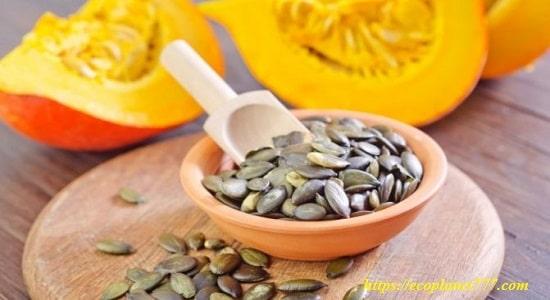
A 100-gram serving of Organic Pumpkin Seeds contains:
- 127 calories
- 15 g carbohydrates (including 0 g sugar and 17.9 g fiber)
- 5 mg protein
- 21.43 g fat, of which 3.57 are saturated
- 20 mg calcium
- 0.9 g iron
- 1 g saturated fatty acids
A 100-gram serving of salted, roasted pumpkin seeds includes:
- 536 calories
- 4 g carbohydrates (including 3.6 g fiber and 3.57 g sugar)
- 32.14 g protein
- 42.86 g fat, of which 8.93 g saturated
- 71 mg calcium
- 16.07 mg iron
- 571 g sodium
Pumpkin seeds are also a source of magnesium, zinc, copper and selenium.
100 g pumpkin seeds contain:
- 7.99 mg zinc
- 9.76 mg iron
- 78.18 mg calcium
- 90.69 mg magnesium
- 20.56 mg sodium
In addition to the nutrients listed above, pumpkin seeds also contain small amounts of folic acid, vitamin B6, thiamine, vitamin A, and selenium.
Healthy Source of Magnesium
In one study, scientists found that 100 grams of pumpkin seeds contained 90.69 milligrams of magnesium. It plays an important role in over 300 enzymatic reactions in the body, including food metabolism and the synthesis of fatty acids and proteins. This element is vital for the proper functioning of the body.
Magnesium deficiency is especially common among the elderly. It is associated with insulin resistance, metabolic syndrome, coronary heart disease, and osteoporosis. So, men aged 19 to 30 are recommended to consume 400 mg of magnesium per day, and women – 310 mg (or 350 mg during pregnancy). Older people should consume a little more.
Good source of protein and energy
Pumpkin seeds are a good source of vegetable protein, on which the growth and development of the body directly depends. Getting the right amount of protein without meat is one of the most important aspects of a vegetarian diet. The body can get 25% of the required amount of protein per day by consuming just one cup of pumpkin seeds.
Pumpkin seeds can also be consumed when you feel tired and lack of energy. They will speed up the metabolism and keep the body alert for a longer period of time. The high calorie content of pumpkin seeds is an excellent nutritional supplement for those who need extra energy for cell and tissue repair, such as people recovering from injuries.
Harm of pumpkin seeds
Pumpkin seeds are considered safe for most people, and allergies after eating them are rare. However, if you have ever had an allergy to seeds, check with your doctor before introducing them into your diet.
In addition, they have mild diuretic properties, so you should not mix them with diuretic drugs.
Who should refrain from eating pumpkin seeds?
- those who take diuretics,
- allergic to pumpkin seeds,
- people with hypoglycemia
- those with low blood pressure.
They also do not mix well with drugs, so they are harmful to the people mentioned above.
Pumpkin seeds can only be harmful if consumed in too much quantity. They are high in fiber, which can cause constipation and bloating.Young children should be supervised when they eat nuts or seeds, as this can cause choking.
For pumpkin seeds to be beneficial and not harmful, do not use them after the expiration date.
The seeds are high in fat, so they are prone to rancidity. Store pumpkin seeds in a cool, dark and dry place to extend their shelf life. Properly stored, pumpkin seeds will keep for 3-4 months.
The use of seeds
Pumpkin seeds have a pleasant taste and aroma. They are eaten alone, as a snack, or added to dishes for added flavor and crunchy texture.
Try making salads with pumpkin seeds. They can be mixed with the main ingredients, or sprinkled on top.
You can also add pumpkin seeds to muesli made from a mixture of nuts and dried fruits.
You can make healthy pumpkin seed oil by mixing dried or roasted pumpkin seeds in a food processor (or coffee grinder) until smooth.
This mass is consumed separately or spread on bread.
If you want to extract the seeds from the pumpkin yourself and prepare for use, then first separate them from the pulp, then rinse with cold water in a colander and dry. Do not use paper towels for this as they may stick.
There are many different uses for pumpkin seeds. Try the simplest and most common – in the oven.
Lay them in a thin layer on a greased baking sheet and bake in the oven at a low temperature for about 10 minutes.Remove from oven and toss with olive oil, salt and seasoning of your choice such as pepper, oregano, cumin or chili powder. Place back in the oven and bake for a few more minutes until they are crispy and golden. After roasting, you can enjoy them as a delicious snack.
Assuming good tolerance, you can consume pumpkin seeds every day, but do not overdo it. Since they are relatively high in calories and also have phytoestrogenic effects, the recommended daily dose is about a quarter cup a day.
Eating more seeds can cause side effects such as constipation, gas or bloating, and can also contribute to hormonal symptoms. In addition, these seeds contain a concentrated amount of calories, so going overboard can potentially contribute to weight gain.
Recipe with pumpkin seeds
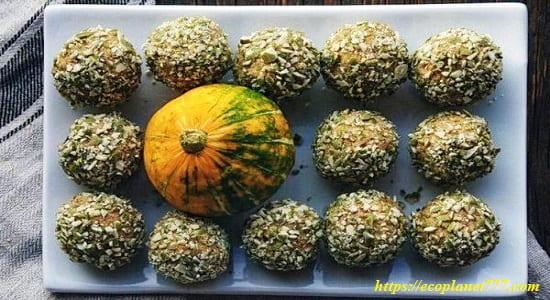
Snack of pumpkin seeds
This recipe calls for just five ingredients, all of which are healthy. It’s perfect for a quick snack or a light breakfast.
Ingredients
- ½ cup oatmeal (instant) or oatmeal
- 2 cups pumpkin seeds
- ½ teaspoon cinnamon
- ¼ cup natural honey (or artificial)
- 2 tablespoons melted coconut oil (cold pressed)
Cooking
Preheat the oven to 125 C. Then cover the baking dish with parchment paper (you can grease it with vegetable or butter).
Place the oatmeal (or flour), pumpkin seeds, cinnamon, honey, and coconut oil in a bowl. Mix all ingredients well. If the mass is too liquid, add more oatmeal (or flour). Then spread the mixture evenly on the parchment paper and make cuts to get the same shape bars.
Bake in the oven for 10-15 minutes. Then let cool for 10 minutes.
You can eat these bars right away or store them in airtight containers. They are incredibly nutritious and fairly easy to prepare.
Pumpkin bread
Ingredients
- 400-450 g flour
- 0.5 st. warm water
- 5 tsp salt (no slide)
- 1.5 tsp dry yeast
- 1 tsp honey
- 2 tbsp olive oil
- 3/4 cup pumpkin puree
- 1 egg yolk for greasing
- pumpkin and sesame seeds
Cooking
Sift flour into a bowl with salt. Dissolve honey in warm water, add yeast, let stand for a few minutes.Combine everything, add olive oil and knead the uncooked dough. Add pumpkin puree, knead well again (so that the puree is evenly distributed) and add the seeds. Shape into a loaf and place in a warm place to rise slightly. Bake in the oven at a temperature of 125-150 C. Bake time approximately 60 minutes until golden brown.
P.S.
If you liked this information and found it useful, please share it on social media. networks with your friends and acquaintances. This is how you support our project “Ecology of Life” and make your contribution to the preservation of the environment!
- Magnetic storms: the sun is testing the planet🌪️ - 13.06.2024
- Why You Should Drink Chicory: Benefits and Harms 🌿 - 09.06.2024
- Innovative Choice: Sproud Milk – Your Ideal Plant-Based Drink 🌱 - 03.06.2024
